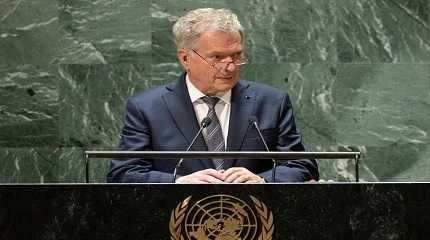
HELSINKI, Nov 20 (Reuters) - Finland's President Sauli Niinisto said on Monday it had become impossible to return asylum seekers who did not meet the criteria for protection, and that this had to be taken into account when policies are set.
Over 500 asylum seekers, mostly from Yemen, Somalia, Syria and Iraq, arrived in Finland via Russia during the past two weeks, leading Helsinki to shut half its border crossings and accuse Moscow of funnelling migrants to its border.
"Deportation of migrants who don't meet the criteria for asylum has become impossible, so entering the border means you stay in that country if you want to," Niinisto said, speaking on a state visit to Poland.
Niinisto called for a European Union-wide solution to stop uncontrollable entry to the passport-free area.
"It is impossible that each country just by itself tries to take care of the situation which might break out in a neighbouring country immediately afterwards," Niinisto said.
Tomi Kivenjuuri, head of the legal division at the Finnish Border Guard, said not all those who arrived had originally wanted to come to Finland, but were forced to seek asylum after Russian authorities had closed border gates behind them.
"They have been left with no other choice in that situation," Kivenjuuri told Reuters.
Asylum can only be sought at two of the remaining four crossing points on Finland's 1,340-km (830-mile) border with Russia.
The Kremlin has denied sending migrants and on Monday announced it had lodged a formal protest over the partial border closure, saying Finland's decision to shut border crossings reflected Helsinki's adoption of an anti-Russian stance.
Further north, at the Storskog border crossing between Norway and Russia, the situation was "normal", a police spokesperson said on Monday.
In 2021, Poland, Lithuania and Latvia accused Moscow's close ally Belarus of artificially creating a migrant crisis on their borders by flying in people from the Middle East and Africa and attempting to push them across the frontier - an accusation Belarus repeatedly denied.




